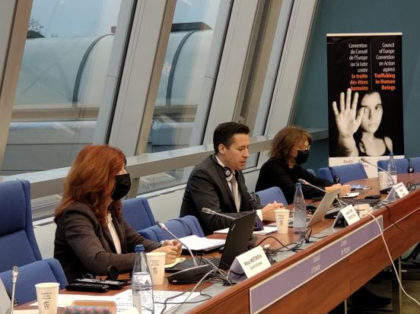60 countries meet to strengthen efforts to end human trafficking
STRASBOURG, 16 November 2021 – The largest annual gathering of National Anti-trafficking Co-ordinators and Rapporteurs took place this week in Strasbourg. Representatives from 60 countries across the OSCE region discussed how to address current human trafficking-related challenges and implement international commitments, policies and standards set forth by the OSCE and the Council of Europe’s Convention on Action against Trafficking in Human Beings.
The Office of the OSCE Special Representative and Co-ordinator for Combating Trafficking in Human Beings (OSR/CTHB) and the Council of Europe (CoE) co-organized the meeting.
“National Anti-Trafficking Co-ordinators and Rapporteurs play a fundamental role in developing national priorities and aligning efforts across the region. This meeting offers a unique opportunity to raise common challenges, identify priorities for action, and encourage implementation,” said Valiant Richey, OSCE Special Representative and Co-ordinator for Combating Trafficking in Human Beings.
Petya Nestorova, Executive Secretary of the Council of Europe’s Convention on Action against Trafficking in Human Beings, added: “The annual meetings of National Anti-trafficking Coordinators and Rapporteurs that we co-organise with the OSCE are an opportunity to learn from each other and mutually reinforce our efforts to be more efficient in combating human trafficking.”
Participants discussed combating trafficking in human beings for the purpose of labour exploitation, the need for National Action Plan (NAP) implementation, and ways to improve monitoring and evaluation of States’ anti-trafficking actions.
Recently, countries have been particularly active on prevention of labour exploitation in supply chains with announcements of a joint emphasis from the G7, new laws in a number of OSCE participating States, and a proposal for import bans of goods produced by forced labour from the EU.
The need for National Action Plans to build momentum and maximize national anti-trafficking responses was also discussed. Findings from a recent study conducted by the OSR/CTHB on NAPs in the OSCE region show that many countries lack dedicated funding to support implementation and current challenges, such as tech-facilitated trafficking, financial flows, supply chains, and demand related to sexual exploitation are not addressed.
Participants also examined ways to improve monitoring and evaluation of States’ anti-trafficking action. Finally, the countries discussed the need to provide support and assistance to victims of trafficking independent of the criminal justice process.
